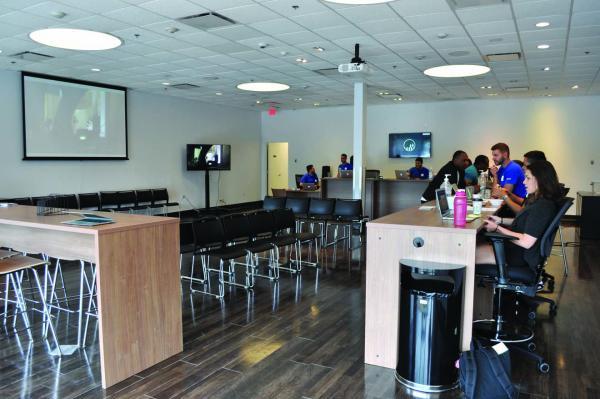June 30, 2016

Service staff in the Dorchester center for Uber’s second Greenlight Hub in Boston. Jennifer Smith photo
As the state Senate prepares to debate a bill regulating ride-for-hire services like Uber and Lyft, drivers are walking around around the new Uber Greenlight Hub in Neponset. The Dorchester shop is Boston’s second, located in a neighborhood where one in fifty residents drive for Uber, according to the company.
The local hubs are designed to whisk new drivers through the process of signing up and getting their paperwork and background checks in order before they head out onto the road.
More seasoned drivers can use the hub as a type of pit stop for the app, a place to resolve fare disputes or issues with the technology.
“It’s just going back to old school, or what seems like old school for a lot of us, in-person customer service,” said Carlie Waibel, an Uber spokesperson. “And we’ve been able to do this in downtown Boston, but having a spot here, we’re on the ground with people who are literally in your neighborhood.”
Drivers should bring in all appropriate paperwork if they are signing up for the first time, and designated representatives will walk them through the process. The hub is not a rider service center, except in cases where a driver finds a lost object in the vehicle and brings it to the hub for pick-up.
About 1,000 drivers a week are expected to pass through the doors in Neponset at peak operations, said Waibel and a manager at the Morrissey Boulevard store, although they have been handling just shy of that after about three weeks. On a busy day, 10 to 12 employees man the center.
On the political side of the story, the Senate bill up for consideration on Wednesday would create a division within the Department of Public Utilities to oversee transportation network companies.
The bill is, on its face, fairly friendly toward ride-for-hire services. Ride-hails are not banned from picking up passengers at Logan Airport and the South Boston convention center, a prohibition sought by advocates for cabs and livery drivers. No fingerprinting mandate is included in the Senate bill, nor was it included in the House version that passed in March.
The requirement for state-run driver background checks, included in the House bill, is not in the Senate version, which leaves the companies themselves charged with conducting the checks and issuing decals to display on the vehicles. Ride-hailing companies would also face a 10-cent-per-ride assessment, and be required to install in-app tipping options.
As to the legislative prospects, the senators have to deal with the 54 amendments that have been attached to the ride-for-hire bill.
Sen. Linda Dorcena Forry has filed five of them, including one that would require driver fingerprinting and another that would allow municipalities to impose their own fingerprinting requirements.
“I’m hoping that my colleagues will recognize the importance of adding another tool around public safety issues,” Forry, a Dorchester Democrat, told reporters after meeting with taxi drivers Tuesday. “And I think fingerprinting, whether it’s mandated statewide or really allowing municipalities to add additional requirements around public safety, is important.”
Conversations involving ride-hailing services have been somewhat contentious from a law enforcement perspective, with fingerprinting a flashpoint. Advocates assert it is a crucial safeguard and the companies reply that the alleged benefits to fingerprinting are not substantial enough to overcome the burden to potential drivers.
Uber and Lyft have strongly opposed fingerprinting, notably halting their operations in Austin, Texas, after the passage of an ordinance requiring the checks. From a driver perceptive, Waibel said they will be alerted to any changes as needed, but “for now, it’s all very fluid.”
The drivers are definitely in tune with what’s happening, she said, “And how we’re messaging is, ‘Continue to do what you’re doing, and we’re going to do everything that we can to make sure that there’s a future for Uber in the Commonwealth.’"
Information from State House New Service was used in this report.
Topics:


